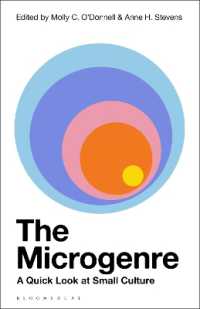- ホーム
- > 洋書
- > 英文書
- > Politics / International Relations
Full Description
Much of the world today views America as an imperialist nation bent on global military, economic, and cultural domination. At home few share this negative view, largely because of a widespread belief in the irreproachable purity of our goals. Bob Pepperman Taylor, however, argues that our moral self-righteousness may potentially imperil our democratic ideals and threaten democracy itself by plunging us into illiberalism.Taylor looks closely at six key thinkers in the Progressive tradition whose work helps illuminate the essential flaws in our current thinking about democracy. Their writings, he contends, offer insights that can reinforce and strengthen a vigorous democratic faith, warn us of the dangers inherent in various forms of democratic arrogance, and counsel a kind of doubt or humility that would make us much better democratic citizens.
All six thinkers—Herbert Croly, Walter Lippmann, John Dewey, Jane Addams, Carl Becker, and Aldo Leopold—were active in the first half of the twentieth century and grew out of and reflect the temper of American Progressivism, which spawned the most creative, optimistic, and committed generation of democratic theorists and activists in American history. Their writings, in Taylor's view, illuminate harmful beliefs that constrain and even delude the popular democratic imagination in America.
Taylor argues that Croly, Lippmann, and Dewey overestimate the normative value of science and underestimate the utopianism of their democratic visions. On the other hand, Addams, Becker, and Leopold resisted these scientific and utopian temptations. By advocating a kind of humility, they offered reform-minded Americans a stronger understanding of what it meant to practice democratic citizenship, however imperfectly. Addams counsels us to "walk humbly before God"; Becker embraces the Progressive faith in equality and justice but discards its dogma of certain progress; and Leopold employs moral authority rather than his scientific training to defend our natural inheritance in what he recognizes is an ambiguous political debate.
These three, Taylor argues, by aiming less at the grand transformation of the human condition than at practical solutions, show greater respect for democratic possibilities than did their more messianic counterparts. They promote a much more modest understanding of the possibilities both for democracy and the role of science in informing democratic practice. They also point to a clearer understanding of the virtues that citizens should cultivate if democracy is to prosper.
Contents
Acknowledgments1. Democratic Doubt
2. The Heavenly City of the Twentieth-Century Progressives
3. Jane Addams: "A Modern Lear"
4. Carl Becker: The Heavenly City of the Eighteenth-Century Philosophers
5. Aldo Leopold: A Sand County Almanac
6. Conclusion
Notes
Bibliography
Index







